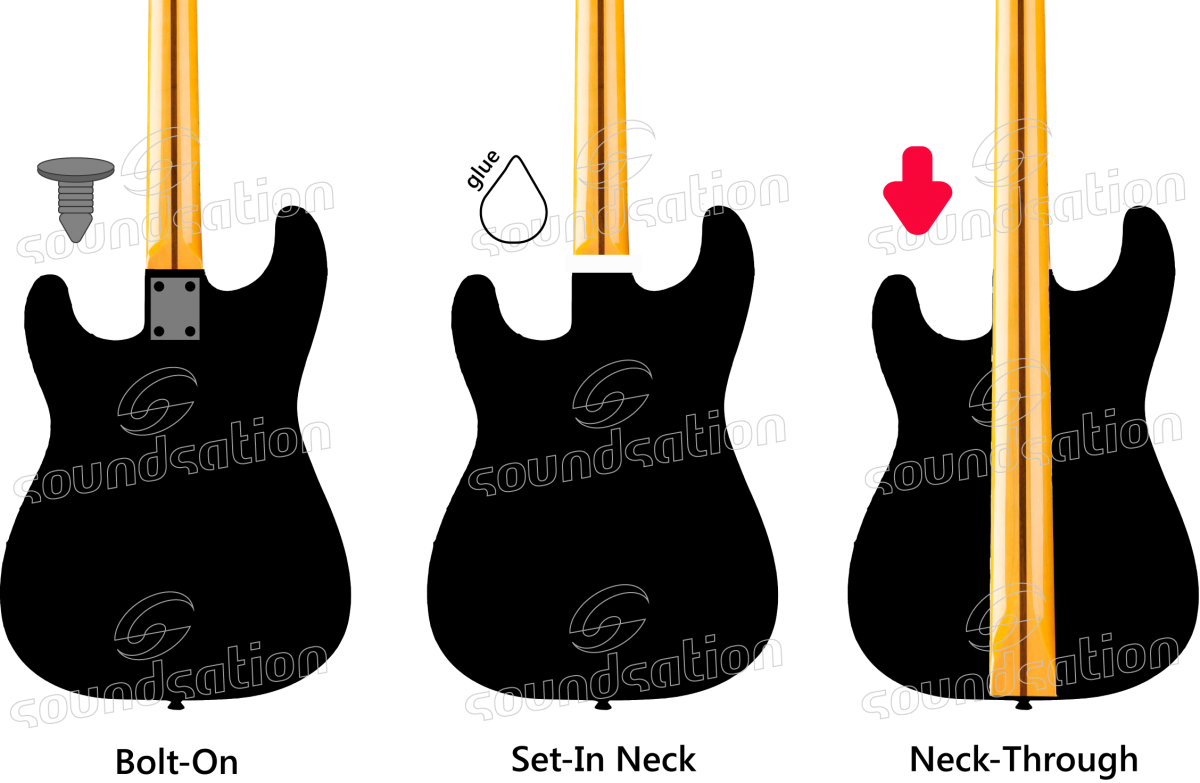This article is dedicated to the different body types of the electric
guitar, in particular to the different structural features, and, most
important, discusses how they influence the sound.
Broadly speaking, the most common classification of electric guitars' body
styles includes: solid body, hollow body (or semi acoustic), semi-hollow,
archtop.
Solid body
Most of electric guitars are solid body,
that simply means that the body is made from solid piece of wood without any
sound box. Sometimes, synthetic resins
are employed instead of wood, that nevertheless is the most commonly
used material. Many types of wood are used, each one with definite physical,
timbral and aesthetical characteristics.
Without any sound box, the sound of a solid body guitar is entirely amplified
using a “pick up”, an electronic device that uses the magnetic fields generated
by permanent magnets. Matching the pick up with the wood and the body shape plays
an important role in defining the global sound of the instrument.
Hollow body (semi
acoustic)
In the hollow-body guitars (also
called semi acoustic), a large
portion of the body is empty (with some models with completely hollow body),
with “f” shaped holes on the top, similar to those on the strings bowed instruments.
As the hollow body is especially prone to acoustic feedback, the soundboard of
an hollow body guitar is often made with laminated wood, that can naturally
damp this unwanted vibrations. For the same reason, the rest of the body is
often crafted with laminated wood. Sonically speaking, this translates in a
more delicate and rounded sound, really suitable for jazz, or opened and
bright, perfect for genres like rockabilly.
Semi-hollow body
To find a compromise between the sound of a solid body and a hollow body
guitar, the semi-hollow body guitar
was born, mainly used in styles like blues and rockabilly. In the semi-hollow
guitar, the body, of inferior depth, is usually built with two lateral sound
boxes and a central portion in solid wood.
Archtop
Today archtop guitars, equipped with pickups, can be considered electric guitars in every respect, but were originally built as acoustic instruments. Named after the shape of the body, convex in the vertical direction, the top has two “f” shaped holes, like those found in hollow bodies guitars. Archtop guitars are usually carved from solid wood, using techniques typical of bowed instruments manufacturing. The amplification employs the so called “floating pickups”, that is, pickups that do not touch the top of the guitar, and the controls are installed on the pickguard too, in order to maintain intact the vibratory performance of the top of the instrument. Mainly used in genres like jazz and blues, is often hand crafted. Over time, arched tops were successfully used for solid body guitars too.
Further
classification:
The way in which the body is jointed to the neck determines a further
classification into 3 different types:
Bolt-on neck: the neck is attached to the body using
screws (usually three or four). The resulting sound emphasizes the mid-high
frequency band, and is dryer in the mid and low end. Nevertheless there are
economical benefits (the manufacturing process is easier) and in customisation
possibilities (for instance, it’s easy to unscrew a neck and use it with
another body).
Neck-thru body: the neck extends through the entire length of the body, becoming the core of the body itself. This results in a longer sustain, optimal tonal balance along the entire spectrum, perfect alignment of neck and body, easier playability thanks to an easier access to the higher frets. But any adjustment of the neck-body jointure becomes impossible, nor the substitution of the neck as in bolt-on models. Of course this solution cannot be applied to hollow bodied guitars, that have a sound box in the central portion of the body.
Set-in neck: the neck is glued to the body. Here we find the same long sustain and tone balance of the neck-thru body construction, but we retain the possibility of acting on the neck-body jointure if required (with the help of a good luthier, as we are dealing with glued parts).

Soundsation offers a large choice of solid body guitars.
Our selection of solid body guitars in the bolt-on version:
Rider Standard, Rider Pro, Rider Retro and some models from SHADOW series
Solid body guitars with set-in neck:
Milestone Pro, Buffalo Pro and some models from SHADOW series
Wanna know more? Read the next post How to choose an electric guitar: neck and fretboard. Enjoy!